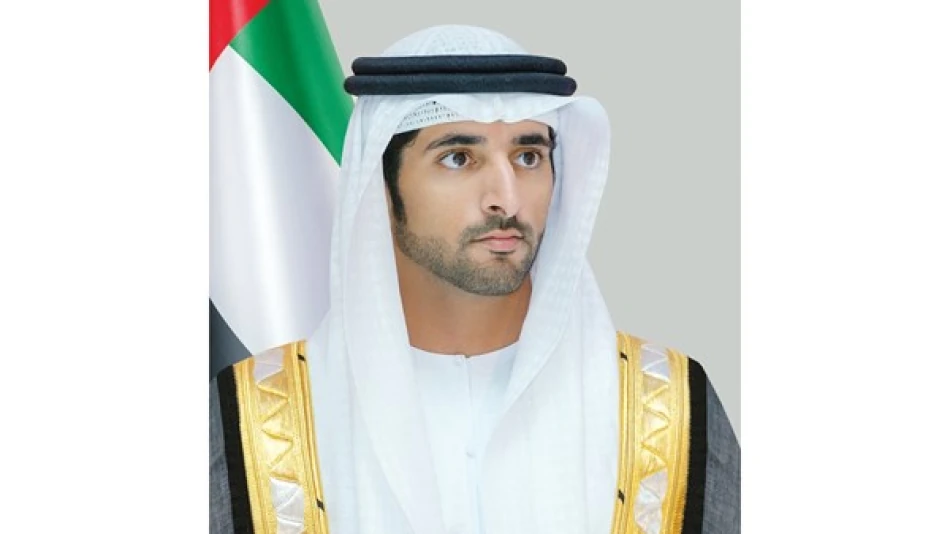
Dubai's Guinness World Record-Breaking Marathon Concludes with Hamdan bin Mohammed's Patronage
Dubai's Mall Marathon Breaks World Record, Signals New Era for Urban Fitness Innovation
Dubai has set a new Guinness World Record for the largest indoor mall running race, with over 40,000 participants completing more than 120 million steps across nine shopping centers during the month-long "Dubai Mollathon" initiative. The achievement underscores the emirate's growing influence in reimagining urban fitness infrastructure and community engagement through innovative sporting events.
Record-Breaking Participation Demonstrates Community Appetite for Accessible Fitness
The initiative, launched in August under the patronage of Sheikh Hamdan bin Mohammed bin Rashid Al Maktoum, Crown Prince of Dubai, concluded with a record-setting finale at Dubai Hills Mall where 1,392 participants from diverse age groups and nationalities secured the Guinness World Record for the largest indoor mall running race.
This achievement represents more than just a numerical milestone. The overwhelming participation—spanning 31 days across Dubai Mall, Mall of the Emirates, Dubai Hills Mall, and six other major shopping centers—demonstrates significant public appetite for accessible, climate-controlled fitness opportunities in the region's extreme summer heat.
Strategic Timing Maximizes Participation
The initiative's scheduling from 7:00 AM to 10:00 AM daily proved strategically sound, offering residents pre-work exercise opportunities in air-conditioned environments during Dubai's hottest month. This timing strategy could serve as a model for other Gulf cities facing similar climate challenges.
Government-Led Fitness Innovation Reflects Broader Economic Strategy
The massive institutional support behind the marathon—including participation from Dubai Police, Roads and Transport Authority, Department of Economy and Tourism, and Dubai Ambulance Services—signals the government's recognition of community fitness as both a public health priority and economic development tool.
Dr. Sultan Al Neyadi, Minister of State for Youth Affairs, emphasized the initiative's role in establishing sports culture as a daily lifestyle, noting that youth formed the largest participant demographic. This demographic engagement aligns with the UAE's broader strategy to position itself as a regional hub for young talent and innovation.
Cross-Emirate Participation Strengthens National Cohesion
Youth councils from Abu Dhabi, Ajman, Ras Al Khaimah, Fujairah, and Umm Al Quwain participated alongside Dubai entities, creating a nationwide fitness movement that transcends traditional emirate boundaries. This coordinated approach reflects the UAE's increasing emphasis on federal-level social initiatives.
Mall-Based Fitness Model Offers Scalable Urban Solution
The success of running tracks spanning over 10 kilometers within existing retail infrastructure presents a compelling model for other urban centers worldwide. Unlike traditional marathons requiring street closures and extensive security, mall-based events leverage existing climate-controlled infrastructure while maintaining commercial operations.
Khalfan Belhoul, Deputy Chairman of Dubai Sports Council, highlighted the initiative's role in establishing Dubai as a global capital for community sports, suggesting this model could be exported to other international markets seeking innovative urban fitness solutions.
Comparison to Global Urban Fitness Trends
While cities like Singapore have pioneered covered walkway networks and New York has experimented with pop-up fitness installations, Dubai's integration of major retail spaces for systematic fitness programming represents a unique approach. The model's success could influence urban planning decisions in other hot-climate cities from Phoenix to Riyadh.
Economic Implications for Retail and Tourism Sectors
The initiative's ability to drive foot traffic to shopping centers during typically low-activity morning hours presents clear commercial benefits for retailers. The 40,000-person participation rate across nine locations demonstrates significant potential for retail activation through fitness programming.
For Dubai's tourism sector, the event establishes the city as a destination for innovative sporting experiences, potentially attracting fitness tourism—a growing market segment worth billions globally. The Guinness World Record provides marketing leverage for future international promotion.
Integration with Dubai 2033 Strategy
The marathon aligns directly with Dubai Social Agenda 33 and Dubai Quality of Life Strategy 2033, both emphasizing community health and social cohesion. This integration suggests similar large-scale fitness initiatives will likely receive continued government support and resources.
Future Implications for Urban Fitness Infrastructure
The marathon's success validates the concept of repurposing existing urban infrastructure for community fitness rather than building dedicated facilities. This approach offers particular value in dense urban environments where land costs make traditional sports facility development prohibitively expensive.
The initiative's emphasis on inclusivity—featuring dedicated events for Emirati Women's Day and participants with disabilities—establishes a framework for accessible community fitness that other cities could adapt to their specific demographic needs.
With climate change making outdoor exercise increasingly challenging in many global cities, Dubai's mall marathon model offers a scalable solution that combines public health benefits with economic development opportunities.
Most Viewed News

 Layla Al Mansoori
Layla Al Mansoori






